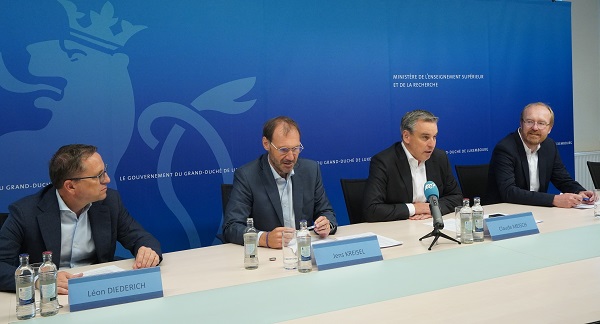 (L-R) Léon Diederich, Higher Education Ministry; Jens Kreisel, University of Luxembourg Rector; Claude Meisch, Luxembourg's Minister for Higher Education & Research; Romain Martin, Higher Education Ministry;
Credit: MESR
(L-R) Léon Diederich, Higher Education Ministry; Jens Kreisel, University of Luxembourg Rector; Claude Meisch, Luxembourg's Minister for Higher Education & Research; Romain Martin, Higher Education Ministry;
Credit: MESR
Luxembourg's Ministry of Higher Education and Research and the University of Luxembourg have confirmed that the latter will absorb the Max Planck Institute Luxembourg for International, European and Regulatory Procedural Law from January 2024.
The Max Planck Institute in Luxembourg-Kirchberg will be integrated into the University of Luxembourg as of 1 January 2024. Luxembourg's Minister for Higher Education and Research, Claude Meisch, and the Rector of the University of Luxembourg, Jens Kreisel, recently announced this news at a joint press conference.
The aim of this integration, which is based on an agreement between the Luxembourg Government and the Max Planck Society, is to optimise the promotion of excellence within national governance structures.
The Max Planck Institute Luxembourg for International, European and Regulatory Procedural Law (MPI) has existed since 2012, founded on the basis of an agreement between the Luxembourg Government and the Max Planck Society. Since then, according to the ministry and the university, it has significantly contributed to the promotion of excellence in the Grand Duchy.
Initial discussions about the future of MPI took place in August 2022 between the Luxembourg Government and the Max Planck Society. The more recent news follows the departure of MPI's directors. According to the principles of the Max Planck Institutes, upon the retirment of the directors, a decision should be made as to whether the institute in question would close its doors or continue to function. The Luxembourg Government proposed a third option: continuing research activities, but with a new governance model.
"In recent years, Luxembourg has developed a series of instruments for promoting excellence that are specifically adapted to the national scientific and socio-economic conditions and challenges," stated Minister Meisch.
The aim, according to the ministry and the university, is to ensure close cooperation between academia, industry and civil society, as well as the government, with appropriate governance structures.
"Considering the strengthening of coherent governance of the entire Luxembourg research landscape, it makes sense to continue the MPI activities in the context of the Luxembourg governance principles and the Luxembourg initiatives of excellence," Minister Meisch continued.
In order to ensure a smooth transition and successful continuation of the activities of the institute, which currently has 61 employees, within the framework of the University of Luxembourg, the Max Planck Society and the Luxembourg Government have agreed to adapt the foundation statutes of MPI at short notice. Romain Martin, First Government Advisor in the Ministry of Higher Education and Research, and Jens Kreisel, Rector of the University of Luxembourg, thus joined the MPI's administrative board on 23 June 2023. Paul Heuschling from the University of Luxembourg has been on the institute's board since 26 July 2023.
Minister Meisch clarified that the government has "given the university completely free rein", adding that the "only requirement was that there should be no downgrading of research activities."
As Prof. Jens Kreisel explained, the academic activities of MPI will be integrated into a new research centre on 1 January 2024 and current MPI employees will start working at the university.
By building on existing academic strength and capitalising on its proximity and collaborations with key EU legal, financial and currency institutions, the new research centre is expected to potentially establish itself as a central hub for European law. "Collaborations of this nature, aligned with long-term EU political objectives such as the dual transition towards digitalisation and sustainable transition, hold the potential to elevate both the University and the country as the forefront of European legal expertise," stated Prof. Jens Kreisel. "The new centre will strive to combine academic excellence with research with impact, fitting neatly in the university's strategic framework for 2039."
In October 2023, the university's Board of Governors will decide on the thematic focus of the new centre. The University of Luxembourg is currently carrying out a comprehensive integration and migration process. The aim is for academic staff to be able to continue their projects at the new centre without interruption. As such, the university has also been regularly informing MPI and university staff members about the ongoing steps and has organised dedicated onboarding sessions.
With the transfer of MPI, the state endowment of €9.4 million will flow into the budget of the University of Luxembourg.









